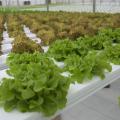Greenhouse Tomatoes
The greenhouse tomato industry in Mississippi experienced unprecedented growth during the 1990's and early part of the 2000's. The number of commercial growers increased from about 15 in 1988, to around 100 today. These growers make up about 18 acres of greenhouse space, all under plastic. Today, Mississippi is ranked 12th in the United States in greenhouse tomato production, with a gross sales value of over $6 million each year. Our most common greenhouse sizes are 24 X 96 and 30 X 96 feet. When more than one greenhouse is used, they are generally connected at the gutter, referred to as "gutter-connected bays." Most of our businesses are small, averaging 2.4 bays.
The national greenhouse tomato industry has also grown rapidly, but this is a more recent trend. Since 1996, there has been about a 40 percent growth in greenhouse tomato acreage in the United States, now at about 1000 acres. Leading states are Arizona, Texas, Pennsylvania, New York, California, Ohio, Tennessee, Mississippi, New Jersey, North Carolina, and Florida.
Frequently Asked Questions
- I would like to convert our poultry houses (or pig barn or cow barn) to greenhouses for the purpose of growing tomatoes. What is the best way to do this?
- How can I prevent blossom end rot?
- My tomatoes are not ripening to an even red color. What is the reason?
- What kind of fertilizer can I use for greenhouse tomatoes?
- Are greenhouse tomatoes a good business for me?
- How many greenhouses do I need in order to get rich?
- If I grow tomatoes in a greenhouse, does this mean they are organic?
- I am planning on using a deep well for my irrigation water. Do I still have to have this water tested? If so where should I send the water sample?
- How often do I need to pollinate?
- Can I use a vibrating toothbrush for pollination?
- What variety of tomato should I use in the greenhouse?
- How many plants can I grow?
- How much yield can I expect per plant?
- What pH should I use?
- Some of the leaves on my plants are turning yellow. What is causing this?
- At what color should greenhouse tomatoes be harvested?
- Why are my plants wilting?
- What are those funny little white flies on my plants?
- What is the fuzzy looking gray colored mold growing on my plants?
- Why do the plants get flowers, but don't set any fruit?
- The fruit are setting and have good size, but they have strange shapes.
- Why do many fruit have a blackish area on the bottoms?
- Why are my plants so tall, like they're stretched out?
- There are cracks in the fruit. Now what?
- Why do the plants produce fruit that are too small?
- Should I use supplemental lighting to increase my yield?
- Can I grow various crops, e.g. tomatoes, peppers, cucumbers, lettuce, and strawberries, all together in the same greenhouse? Or will this create an unmanageable problem for me?
- I've been thinking about growing greenhouse strawberries. Will this work?
- Where can I get help in learning more about greenhouse tomatoes?
- How can I get answers to other questions which I don't find in this FAQ?
- What causes tomatoes to become mealy or soft?
Publications
- Greenhouse Tomato Growers' Glossary
- Fertigation: The Basics of Injecting Fertilizer for Field-Grown Tomatoes
- Homgrown Flower, Herb, and Vegetable Transplants
- Greenhouse Tomatoes: Pest Management in Mississippi
- Greenhouse Tomato Budgets for Mississippi
- Tomato Troubles: Common Problems with Tomatoes
Other Information
Publications
News
RAYMOND, Miss. -- Current and prospective greenhouse vegetable growers can learn about the specialized production method during Mississippi State University’s 2024 Greenhouse Vegetable Short Course on Feb. 27-28. The course will be held at the North Mississippi Research and Extension Center’s Magnolia Building in Verona from 8 a.m. to 5 p.m. each day. It is open to greenhouse vegetable producers throughout the Southeast.
STARKVILLE, Miss. -- Vegetable growers soon will have two chances to learn about managing pests on produce in greenhouses and high tunnels.
Success Stories
Nursery using Extension publications to host workshops, reach new customers
Business continues to blossom at Jackson Farms in Bassfield, and one reason may be because the family-owned nursery connects with its clientele in ways that its big-box competition does not.



